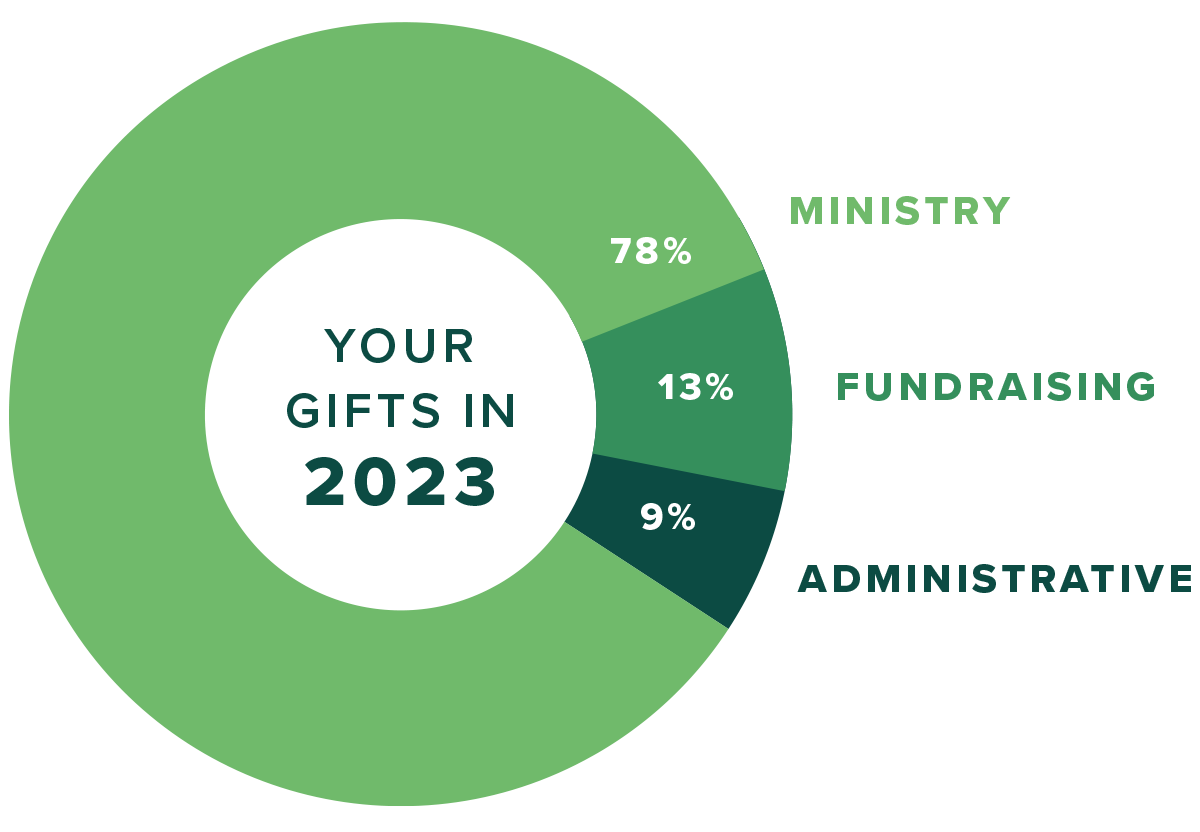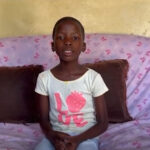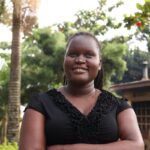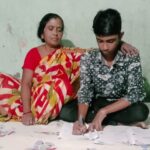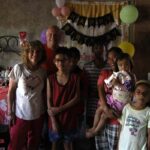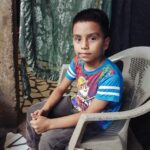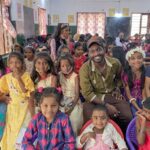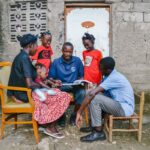A Maasai family in Kenya shares what the availability of clean water at a OneChild Hope Center means to their parched community.
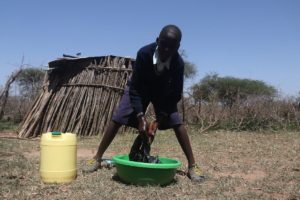
Orumoi, a sponsored boy in Kenya (also pictured at the top of the page drinking water), washes his clothes outside with precious water.
Orumoi, a sponsored boy in Kenya, lives with his family in Kikurro, a hilly, impoverished village in Kajiado County. Kajiado is 65 miles southwest of Nairobi, Kenya’s capital.
He is registered into the OneChild program at Kikurro Hope Center, a half-mile from his home.
The community in Kikurro has long struggled to access clean water. And just like most families, Orumoi’s family of 10 was no exception.
His mother Rose says since she moved to Kikurros when she got married 30 years ago, the struggle to find water has not changed, and that it only gets worse during drought.
For 30 years, she’s been walking 7 miles per trip daily to get water from a river. However, to get the 8 gallons her household needs each day, she has to make two trips.
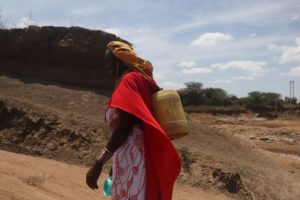
Rose, Orumoi’s mom, had to walk 7 miles per trip every day to fetch water for her family.
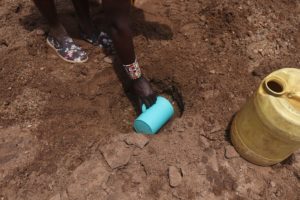
When the river dried up, Rose would scrape at the sand until reaching the water table.
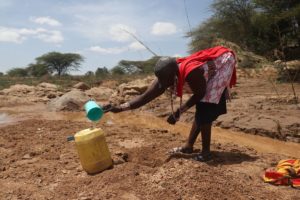
If the river was running, Rose would scoop water from it to fill the jug to carry home.
Her daily routine included waking up at 4 a.m. to milk her goats and cows, and then preparing tea for her school-going kids. She would then take her livestock to graze 3 miles away, always carrying a 5-gallon container to fill when she passed the river on the way home.
“My head was always wrapped around getting water,” Rose says. “So even as I did other duties, fetching water was top of mind, and I would only rest for a bit after I had fetched it.
“The process was tiring for us who own no donkeys, and that is why you will find most older women in this village with depression-like marks on their heads because of effects that the ropes would leave after balancing the water on our heads for long distances over the years.”
Never Enough Water to Meet Needs
For her eight kids and husband, the 5-gallon container of water was never enough for all they needed it for. She’d still have to carry clothes to the river and wash and dry them there, before taking a bath and then returning home with water for cooking, drinking, and washing utensils.
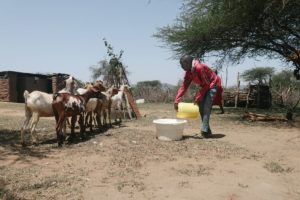
Orumoi pours water for their livestock, saving them a long trip to the river and back.
The kids, too, would walk to the river to wash their uniforms and bathe after school.
Their livestock also suffered from lack of water. The Maasai community who largely occupy Kajiado county are nomadic pastoralists, or herders. Like the people, animals in Kikurro had to walk a long distance for water.
“Even if the animals had grazed well and full, they would arrive home in the evening so tired and looking weak because of the long distance to the river and back home,” Rose says.
For Orumoi, his biggest challenge was missing out on evening studies at his school because he had to fetch water after school.
“I never attended most of the evening tuition,” he says. “I would always be doing my homework at night using a paraffin lamp because I would be fetching water while others are in school reading well because the classrooms are well lit with electricity.”
He says fumes from the lamp left his eyes red and teary, and he would sometimes develop a cough. This affected his performance at school because he’d have to stay up late to complete his homework and feel worn out the following morning.
Orumoi’s school instructed all kids to carry 1½ gallons of water every morning to school, so it could be used to clean the classrooms and cook their lunch. Orumoi luckily lives close to the school, but other kids in the community live over 3 miles from it.
River Dries Up During Droughts
The river that is a source of life for this community is seasonal. During very dry months, the river dries up, and people are forced to dig into the riverbed to get water.
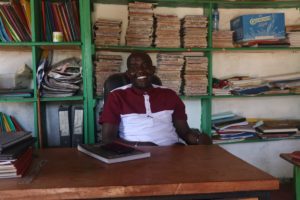
Pastor Momboshi’s prayers for a reliable water source were realized when generous donors paired with OneChild to drill a water well.
Rose says the water from the riverbed was not healthy for consumption, but they had no other options.
“When the river is dry, animals walk through as they head out for grazing or when they come in to take water. They excrete, and this goes into the water underground,” she says. “So, when you dig up and get the water for cooking, for example, tea, the smell of animal urine would be in the tea, but what do you do?”
Pastor Momboshi, who serves at the church that hosts the Hope Center, says the cry of people in the community and even in the Hope Center made him cry to God for help.
He says that since 2009, when OneChild set up the Hope Center there, they used to purchase 792 gallons of water per program day, which cost the equivalent of $40.
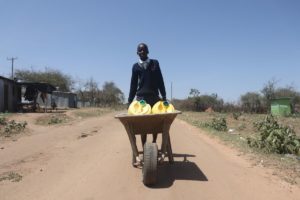
Orumoi brings jugs to the new well to fill up for his family’s needs.
Even then, there was never enough water. “We had to ration the water so that every child would get some,” Momboshi says. “It was hard then. Imagine having to limit water, which is life, for kids just so that everyone gets it.”
He says the more he prayed about the water, the more he was convinced that they would one day put an end to the cry for water. He just didn’t know when, how, and who would help the community, but he trusted God.
“This place gets dry, but I knew and trusted that God would change this little desert into a paradise,” he says.
Generous Donors Answer Prayers
And as he prayed, God sent help. In 2021, Celebration Church in Shreveport, Louisana, partnered with OneChild to gift the community with a well.
A borehole was drilled at the Hope Center, and by December 2021, fresh water was available to the community for the first time in its history.
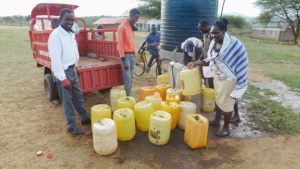
Members of the community stop by the new well to fill up their jugs with fresh, clean water.
“I had never before drunk fresh water at home,” Orumoi says. “It was my first time tasting fresh water from the borehole. I am beyond delighted that someone gifted us this borehole.”
In addition to drinking fresh water, Orumoi now attends his evening school session because he no longer has to walk a long way to get water. He also gets to shower daily, wash his clothes with ease, and no longer carries water to school because the school gets water from the Hope Center, which is adjacent to it.
His mother says she now has time to rest because she no longer spends hours fetching water every day. She is also able to do her laundry, cook, and have enough drinking water for her family and livestock.
Community members are now able to easily get water from the Hope Center for their households and animals.
Rose adds that the presence of water has helped curb violence that had cropped up in the community.
“Our young girls and women were being raped and attacked as they went down to the river to fetch water,” she says. “We had people hiding up in the bushes near the river, waiting to attack any girl or woman who walked alone to the river, and we were beginning to fear for our girls and women.
“This water has not only quenched our thirst as a community, but it is also helping keep our girls and women safe.”
Pastor Momboshi says that in addition to the Hope Center now having enough water for everybody, church attendance has greatly improved.
“Before, we had to wait until 11 a.m. to start our church services on Sundays because people would be out fetching water from 6 a.m. til around 10,” he says. “But now, we begin our services at 8 a.m., and those that don’t have water at home get to go home with water after the service.”
With the availability of water, Pastor Momboshi also hopes to plant trees and flowers at the Hope Center to beautify the landscaping.
Your gift to the OneChild Partners Fund helps kids in hard places, like Orumoi, access what they need to survive – and thrive.
We are accountable to the children we serve AND to our donors.
Our accountability to our donors is one of our highest priorities. Our goal is to use the funds entrusted to us as wise stewards. To do this requires continued monitoring of our fund distribution. OneChild is also a member in good standing with the Evangelical Council for Financial Accountability (ECFA)
